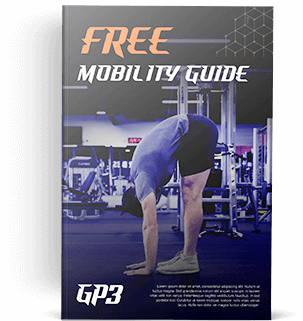Key Points:
1. We tend to think of the mind and body as two different “things.”
2. But, separating mind and body requires drawing arbitrary lines that don’t actually exist.
3. Doing so has negative consequences on our physical and mental health, which aren’t actually different things!
Estimated Reading Time: 4-8 Minutes
I wanted to discuss this topic today because I realized in my piece last week about ice and injuries, I frequently used language that indicates separation between “us” and “our bodies.” Lines like, “Now, let’s look at an ankle sprain. Deep down, we probably know that we can’t actively do much to repair damaged ligaments. The body needs to do that without us exerting any direct influence. And yet, we want to do so much.”
At the risk of sounding overly philosophical, who is this “we” I’m referring to? Is this “we” separate from the body? I certainly seemed to imply so. The easy answer to the question of, “Who is this ‘we’?” is “the mind,” but I don’t think that’s entirely correct either. In fact, I’d argue it’s totally inaccurate to think of the mind and body as separate “things,” because they’re mutually functioning, symbiotic parts of the same whole.
Arbitrary lines
In that same vein, here’s some food for thought from Alan Watts, wise philosopher, flawed human (like all of us), and incredibly interesting character all around. I’ll paraphrase:
“We see our fingers, arms, and legs as undeniably ‘part’ of our body. And yet, we could easily survive without any of them. However, we don’t feel that the air we breathe is part of our body, even though without it, we’d be dead within minutes. Isn’t that strange?”
Now, maybe you think that in the above example, we feel that our limbs are part of our bodies because we have physical control over them, but not the air we breathe. Fair, but we don’t really have any direct agency over the functioning of our brain, heart, and lungs, do we? And we certainly consider those to be part of our bodies.
Regardless, this question illustrates something I’ve recently been fascinated by: the arbitrary nature of the lines we draw when trying to make sense of the world. To be clear, there’s nothing inherently “wrong” with doing this. Making these distinctions seems pretty vital in day-to-day functioning especially when we remember that nuance and gray area exist. If we asked ourselves, “…But what is an espresso, really? When do hot water and beans cease being distinct entities and truly become a latte?” every time we ordered breakfast from the local coffee shop, life would grow quite exhausting, quite quickly.
So, the arbitrary lines of language can be useful in certain contexts.
But, as I clearly showed above, our language leads us to separate mind and body all the time, which creates an insidious trap. This separation has its roots in the philosophy of Rene Decartes, and goes back hundreds of years. Descartes is considered the father of modern philosophy, and his ideas continue to be influential today. This article from the peer-reviewed Internet Encyclopedia of Philosophy says,
“Descartes distinguishes intellectual perception and volition as what properly belongs to the nature of the mind alone while imagination and sensation are, in some sense, faculties of the mind insofar as it is united with a body. So imagination and sensation are faculties of the mind in a weaker sense than intellect and will, since they require a body in order to perform their functions.”
This is a fancy way of saying that some abilities belong to the mind alone, while others don’t. Well, Father Philosophy, I disagree. Separating mind and body can only be done with completely arbitrary lines, and doing so has many negative consequences, too. Let’s explore this further, shall we?
An Unnecessary Adversary
When we attempt to separate mind and body, it creates inherent conflict. It can even lead to an adversarial relationship with one’s body, or the tendency to identify with thoughts like, “Why is my body doing this to me?” and “I hate my body.” or, “My body is just the carrying case for my much more important brain.”
Believing these things doesn’t tend to make us feel happier or live healthier lives. But we can hardly be blamed for falling for this line of thinking. It’s certainly true that much of the experience of being “ourselves,” or the nature of the mind and how it works elude an easy linguistic explanation. They’re also difficult to test using the scientific method.
But, our collective response as a society has generally been to devalue the experience of mind. Descartes’ philosophical musings were partially responsible for the general practice of leaving mind and the “big questions” to religious authorities, while the body stayed in the domain of science. So, we’re conditioned from a young age to believe that these two things are separate.
But, really, how could they be? Someone explain this to me. Our inner experience of mind isn’t the same in a vacuum. The brain requires blood and oxygen provided by the body in order to function. And, what do we call a body without a functioning brain to innervate its nervous system? A corpse. So, why do we insist on treating these two as separate?
And yet, we do. This has real consequences.
It’s all real, even if it’s “all in your head.”
This brings us to one of the most condescendingly unhelpful things a medical professional can say. Even if it’s only implied, few things diminish someone’s experience more than the suggestion that pain is “all in their head.”
Let’s stop for a moment and ask ourselves, “What does that even mean?” The direct translation is probably something like, “We can’t find any physical reason for what you’re experiencing.” Okay, fine. But, if someone is experiencing pain, it’s real. Full stop. There are a multitude of reasons why pain could be present, but implying that it’s all in the head of the perceiver? Perhaps this soothes the stumped professional’s ego, but that’s about it.
One of the most fascinating examples of this that I’ve come across is phantom limb sensation. In case you’re unfamiliar, it’s been consistently reported that after amputation, some patients can feel pain in the space where their limb used to be. One man even reported experiencing the sensation of his orgasms in the space where his amputated leg used to be. Wild!
If you’re prone to cynicism, you could say that people are lying about this. But really, what’s their motivation to do so? Instead, I think it hints back at the arbitrary lines we draw. Our minds, bodies, the world, and even existence as a whole are this meshed together, inseparable…something. But not exactly a “thing,” either. Alright, enough metaphysical musings for one blog post.
Here’s the point:
There is no benefit to be had from separating mind and body. In fact, there are many negative consequences. Instead, we should treat them as one unified whole, and take care of them as such. Neither should be assumed to take priority over the other, because, well, they’re the same thing! I dream of a day when we no longer see “mental health” as different from “physical health.” Each one undeniably affects the other.
Lest you think I’m incredibly naive, I do realize that this would require a major change in the way Western medicine operates. Practitioners are currently encouraged to specialize in ever more narrow fields, and there is certainly something to be said for depth of knowledge. However, we must (cliche alert!) avoid missing the forest for the trees. Delving too deeply into one area can cause us to miss the inherent interconnectedness of the system as a whole.
And it’s not just medicine. Mass shootings and rising “deaths of despair” are labeled as “mental health issues,” as if that classification takes us any closer to solving them. When we see the mind as a separate object, it becomes too easy to dismiss someone as “crazy” or “irredeemably flawed,” rather than understand that a near-infinite number of factors led them to be the way they are.
I get it though. This can seem overwhelming and exhausting. So, we can start small by focusing on the way we view the mind and body.
Let’s not separate them.
That separation requires drawing an arbitrary, imaginary line. And if you go looking, good luck actually finding it.

